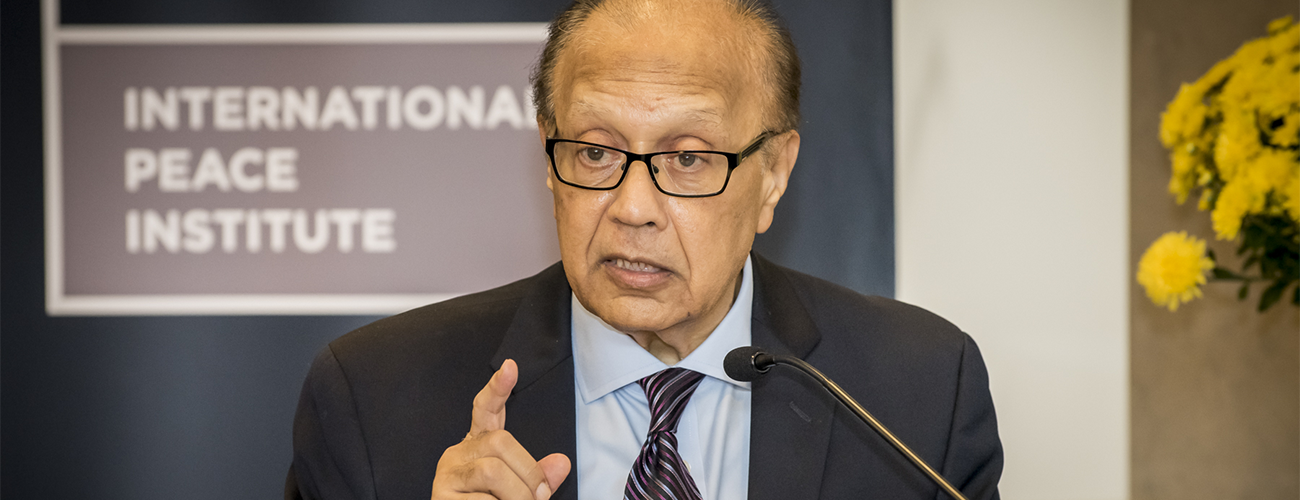On September 12, IPI and the Al-Babtain Cultural Foundation commemorated the 20th anniversary of the United Nations General Assembly’s adoption of the Declaration and Programme of Action on a Culture of Peace and contemplated the path forward with the Sustainable Development Goals (SDGs).
“As we look back on those 20 years, in retrospect, the Declaration and Programme of Action can be seen in the context of a larger process that connects the Culture of Peace to the adoption of the 2030 Agenda for Sustainable Development,” said IPI Vice President Adam Lupel.
“What both agendas recognize is that to achieve a sustainable peace, one needs to do more than end conflict or stop violence, one needs to build positive foundations for mutual respect, prosperity and broad-based inclusion,” he said.
Maria Fernanda Espinosa Garcés, the outgoing President of the General Assembly, noted that the time of the declaration’s adoption 20 years ago was a “high water mark of optimism” but now seemed “very remote indeed.” She lamented that recent years have been marked by “backsliding”.
“We have seen backsliding on international laws and norms, and a backlash against the agenda adopted 25 years ago,” Ms. Espinosa remarked, recalling the last year of the General Assembly. She noted that the impacts of this phenomenon are evident in “rising unilateralism, nationalist populism, and extremist ideologies” as well as in pushback against “hard-won multilateral agreements and institutions and in the loss of trust between people, governments, and institutions.”
Ms. Espinosa cautioned that “a positive, dynamic, participatory process, where dialogue is encouraged and conflict resolved in a spirit of mutual understanding,” is, as she put it, “sorely needed.”
Despite Ms. Espinosa’s emphasis on “the headwinds facing multilateralism,” she noted with optimism that the international community had still been able to accept what she regards as “the most ambitious, wide-ranging set of Sustainable Development Goals.” But she added that efforts to achieve the 2030 Agenda will require continued dedication to a culture of peace.
Anwarul K. Chowdhury, Founder of the Global Movement for The Culture of Peace, recalled the origins of the Declaration and Programme of Action on a Culture of Peace, as well as his involvement in the negotiations that led to the document. “In simple terms,” Mr. Chowdhury explained, “the culture of peace means that every one of us needs to consciously make peace and non-violence a part of our daily existence.”
Elaborating, Mr. Chowdhury said, “we should not isolate peace as something separate or distant,” especially from our own lives, because to do so would downplay the role of individuals in creating a culture of peace. “When we talk about peace, we expect others, such as diplomats and politicians, to take the initiative. But when we speak of a culture of peace, we know that action begins with each one of us.”
Mr. Chowdhury concluded his remarks with an outline of three key approaches to “bolstering the global movement for the culture of peace.” He first highlighted the importance of education and the role that educational institutions must play in creating “responsible and productive global citizens.” He then turned to the significance of youth and children to a culture of peace, urging that early childhood is the best time to “sow the seeds of a culture of peace.” Lastly, Mr. Chowdhury explained the significance of women, advising that “without peace, development cannot be realized. Without development, peace is not achievable. But without women, neither peace nor development is possible.”
Masud Bin Momen, Permanent Representative of Bangladesh to the UN, responded to Mr. Chowdhury’s emphasis on education and underscored the part that Bangladesh has played in promoting education for a culture of peace. He explained that “from the birth of our nation, we have invested a lot in education and literacy.” Mr. Bin Momen continued, “the challenge, not for Bangladesh alone but for all countries, is trying to inculcate the culture of peace in the mind of our children,” especially when the media environment is seen as promoting violence.
Jimena Leiva Roesch, Senior Fellow at IPI, voiced an optimistic view of the potential for a culture of peace, suggesting that “in this moment of troubled times, sometimes our innate mechanism is to shut down, but truly what we explore at IPI is that this time also offers a moment of greater self-awareness.” Ms. Leiva Roesch, reflecting on the passing of the 2030 Agenda, said, “things were transforming and changing, and it really did feel like the world as a whole was moving as one. Fast forwarding four years into the present,” she acknowledged, “we’re in a dark time, but this time also brings treasures of self-awareness and continued challenges to our cultural narratives,” which may open the door for the further cultivation of a culture of peace.








